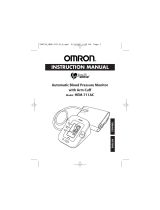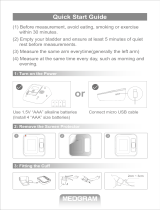
16
3.Using the Unit
4. Press the O/I START button to turn
the monitor off.
Note: If you forget to turn the
monitor off, it will
automatically shut itself off after five minutes.
Important:
• Wait 2-3 minutes before taking another blood pressure
measurement. Waiting between readings allows the arteries
to return to the condition prior to taking the blood pressure
measurement.
• If you move during measurement, the movement display
( ) may appear. Repeat the measurement and remain still
until the measurement is complete.
• Your blood pressure monitor includes an irregular heartbeat
feature. Irregular heartbeats can influence the results of the
measurement. The irregular heartbeat algorithm automatically
determines if the measurement is usable or needs to be
repeated. If the irregular heartbeat display ( ) is shown
after you have taken a measurement, repeat the
measurement. If the irregular heartbeat display ( ) is
shown frequently, please make your doctor aware of it.
• If your systolic blood pressure is above
135 mmHg or your diastolic blood pressure is
above 85 mmHg, the heartbeat symbol will blink
when the measurement result is displayed.
Recent research suggests that the following
values can be used as a guide to high blood
pressure for measurements taken at home.
This criteria is for home blood pressure measurement.
For professional office blood pressure measurement criteria,
please refer to Chapter 9 “Some Useful Information about
Blood Pressure”. Also in special cases (such as diabetics,
Systolic Blood Pressure Above 135 mmHg
Diastolic Blood Pressure Above 85 mmHg
























